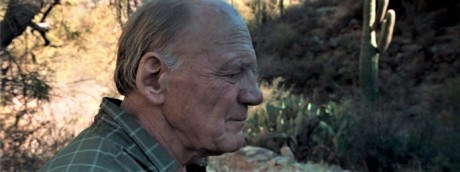


Anders Østergaard: Winter Journey

When Anders Østergaard received the Carl T. Dreyer Award five years ago, these were accompanying words on this site: Østergaard has developed his own original and playful take on how to treat creatively the past… it was just after he and Hungarian Erzsébet Rácz had premiered ”1989” that in an excellent way brings back, what happened when the iron curtain fell, told with the young Neméth, prime minister in Hungary, as the main storyteller.
I remember that the two directors were part of a small Danish film delegation visiting Saint Petersburg, where film students were surprised that you could do documentaries in that way… They loved how the film’s archive scenes with among others Honecker and Gorbatjov – and with words taken from official meeting documents – had the leaders lip-synced to bring the audience the authenticity. So what Gorbatjov said was right but the students could also hear that it was notGorbatjov himself, who spoke. No problem for them but the teacher, an old friend of mine, said to me: You can’t do that, that’s not documentary…
The same comment did not come up, when we selected ”Winter Journey” for the upcoming DocsBarcelona online festival. But it was obvious that the film stood out from the observational or essayistic or personal films that the selection committee otherwise had decided to include. And some commented that it is unusually to have an actor in the film, Bruno Ganz! A fantastic scoop for the film.
Anders Østergaard breaks the genre rules – if you can talk rules today. He is a strong director in today’s Danish cinema. He circles around historical and political themes (you could also mention ”TinTin and Me“ and „Burma vj“) and in ”Winter Journey” he also plays with archive material in a free and playful manner. The young actor who plays Günther Goldschmidt walks into street archive photos, scenes that the old Goldchmidt (Ganz) remembers are reconstructed, interpretation – at the same time as the information necessary, is given the viewer to understand that the nazi regime let a Jewish Kulturbund exist, where Günther Goldschmidt was a flutist and his wife a bratchist.
The two stayed in Germany – we were happy, we were fine, says Goldschmidt, in the dialogue that the film is built upon between Goldschmidt senior and Martin Goldschmidt junior, who from behind the camera asks his father questions, insisting on answers – I want to know my family, my Jewish story… Goldschmidt senior says „I never considered myself a Jew“. Martin’s parents got out from Germany to USA in 1941, Günther – who in America became George – never continued his music career, the mother did, but he became the owner of a furniture company. But WHY almost shouts Martin in a key scene. „Someone had to bring the bacon…“, was the answer.
The film’s story has books of Martin Goldschmidt as background, he himself being a man, who has or has had a radio program with classical music. The dialogues in terms of wording function very well but the voice of Martin Goldschmidt sometimes give my ears the sense of him not being an actor, or is it because we don’t see him? Or is it simply because the one in front of him is an actor, and one of the best you could have. Bruno Ganz simply is the father, who fled Nazi Germany and with fine small facial features reluctantly communicates, what happened, when Hitler, Goebbels & co allowed music and plays to be performed… after some time with Jiddisch language as the only one. Also here Østergaard puts words to persons in the theater archive – what is this kaudervælsk language being spoken by German actors! The Jewish Kulturbund went in 1941 from being a Kulturbund to Endlösung.
It’s all about music and there is so much classical music in this film. Of course. In the Danish press material the director argues that the great classical music normally takes too much space in a filmic narration. Agree! Here, he says, the music is an independent character that pushes the story. “When art and destiny meets as in the story of the film, when the inner world of thought meet the outer reality, it becomes totally electric for me.“ (My translation).
And a beautiful quote from the film „Music is like Life itself and Life will always continue, no matter what will happen to us“.
Denmark, Germany, 2019, 87 mins.